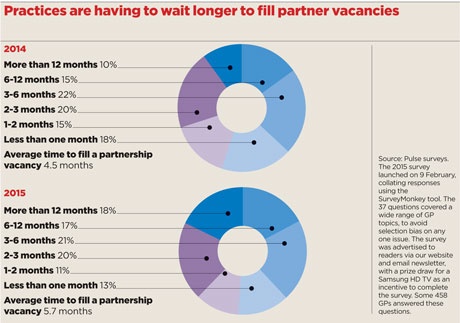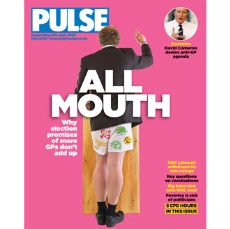Fantasy vs reality – why election promises of more GPs don’t add up


The 2015 general election has left a legacy of outlandish promises that politicians will come to regret.
From the Conservatives’ pledge of seven-day GP opening and same-day access for the over-75s, to Labour’s guarantee of a GP in every A&E and appointments within 48 hours, the commitments suggest all the party leaders have completely lost touch with reality.
And no matter which party wins, it will see its fantasy bubble pricked. Because all these promises rely on one thing: more GPs.
The Conservatives say they will supply 5,000 new GPs over the next Parliament. Labour and UKIP have topped this with 8,000. The Liberal Democrats made the extraordinary claim that they would be able to ‘fund 38,000 more GPs’ – although when challenged by Pulse they admitted this was just an ‘illustrative’ figure and 5,000 was more likely.
But all this is pure cloud cuckoo land. The number of GPs per head of population is falling and new data gathered by Pulse show that practices across the country are finding it almost impossible to recruit.
Morale and workload
One in 10 full-time-equivalent GP partner positions is vacant – up almost 50% since last year – and a fifth of practices are waiting a year or more to fill a vacancy. GPs say this is putting huge pressure on them, but the future looks even bleaker.
The results of a recent BMA survey suggested a third of GPs plan to retire within the next five years.
At the other end of the scale, medical graduates are shunning general practice, due to concerns over morale and workload. This year, 30% of postgraduate GP training places are unfilled after the first round of recruitment, compared with only 9% at the same time in 2013.
And this situation has developed despite promises in 2010 from the then health secretary Andrew Lansley of a major boost to the number of GPs in training. This has patently failed to materialise and, in any case, new GPs take 10 years to train, so none of the promised new recruits will add to the tally being pledged by the main parties.
The various health spokespersons have mumbled that a focus on ‘personalised care’ and a boost to NHS funding will attract new GPs. But GP leaders point out that none of them has come up with any viable plan to boost GP numbers.

Funding shortfall
The promise of more NHS funding is an illusion. Labour has promised a £2.5bn cash injection every year, but this looks puny compared with the £8bn increase in funding demanded by NHS chief executive Simon Stevens in his Five Year Forward View.
Both the Conservatives and the Liberal Democrats have committed to the £8bn per year, but Mr Stevens’s calculations are predicated on the NHS itself delivering unprecedented ‘efficiency’ improvements of 2% to 3% a year.
But figures published recently by the Health Foundation show that crude productivity fell in the NHS by almost 1% a year in both 2012/13 and 2013/14. The kind of savings Mr Stevens wants are going to be a huge ask, even without the extended access to GPs promised by politicians.
Related articles
Election 2015 – do the pledges add up?
CCG recruitment programme targets Dutch GPs
Dr Sarah Wollaston: ‘Politicians forget we don’t have a surfeit of GPs’
NHS England has agreed a workforce plan with the GPC and the RCGP, but the £10m plan – including golden handshakes for new recruits into underdoctored areas and a simplified process to encourage retired GPs and expats to return to UK general practice – is widely regarded as a drop in the ocean.
GPC education and training subcommittee chair Dr Krishna Kasaraneni says the political parties must commit to fund GP services for the long term, rather than funding short-term political follies.
He says: ‘I have seen no pledges that have offered anything meaningful. To say “we will produce 5,000 or 8,000 extra GPs in five years” when it takes 10 years to put a person through foundation and GP training doesn’t add up. Unless somebody has a Back to the Future DeLorean they can use to manipulate time, I don’t see how they can create that many GPs in that short time. What is missing is detail. They are coming out with blank, high-level statements that are either a play on words or simply political games.’
Dr Kasaraneni adds: ‘What we need is not bailouts, but sustainable, long-term investment. How are we ever going to be able to provide seven-day access or appointments to everybody within 48 hours, without the workforce for it? This is nonsense and not the kind of promise they should be making.’
RCGP chair Dr Maureen Baker says a focus on returners and retainers is crucial: ‘We have a chronic shortage of GPs across the UK. Whichever government comes into power after the election needs to tackle this as a priority.
‘We have a plan – our joint 10-point plan that we launched with NHS England, Health Education England and the BMA – to build the GP workforce. Employing 8,000 more GPs by 2020 will undoubtedly be challenging, but our analyses suggest it will be possible with maximum effort to recruit, retain and return.’
The new induction and returner scheme, launched in late March, does make it easier for trained GPs who have taken a career break to return to front-line patient care in the UK – giving practices that take on returners an £8k annual grant.

Meaningless numbers
The RCGP has stepped up its efforts to sell general practice to trainees – although a YouTube video stating it was the ‘best time in a generation to become a GP’ proved controversial – and NHS England has even resorted to advertising in Australia to tempt GP expats to come back home.
But Dr Baker adds: ‘So far during the election campaign we have heard a lot of pledges from all political parties about how they will “tackle” general practice and provide more weekend and evening access to our services. These sound good, but without more GPs, more practice staff and significant investment in general practice, they are meaningless.’
And all of this is cold comfort for GPs struggling to recruit right now. Dr Raghunandan Vedapanakal, a GP in Whitehaven, Cumbria, said his practice had been two GPs short for two years, with 13 GPs covering 24,000 patients.
He says: ‘We are in a rural area and there is a lack of GPs because of a national crisis. GPs are taking early retirement due to pension reforms, work stress and too much meddling by CCGs and the Government. There is increasing demand from an ageing population, stagnant or decreasing income, GPs emigrating and 12-hour working days.’
GP Dr Imogen Bloor has had to close her practice in Islington, north London, after finding it impossible to recruit new GPs.
She says: ‘We have tried our utmost to find a way of continuing to provide high-quality care for our patients, but we feel unable to take the practice forward.’
If practices are to be expected to open longer, or guarantee appointments within two days, the new occupant of Richmond House will have to supply an awful lot more GPs – and soon.
Additional reporting by Eleanor Bley Griffiths.
‘In my area, 60% of GP training places are unfilled’

I do not think the mainstream political parties have really grasped the reasons as to why we have ended up in this desperate situation.
I also do not think that they have demonstrated genuine commitment to increase numbers. We have already seen more training places going unfilled during 2015, when the current Government had hoped for a ‘sharp’ increase in the number of trainees.
In the North-East itself, the number of training vacancies has passed 60%. This spells very difficult times for general practice ahead.
The pledges [made by politicians] are grossly unrealistic and misleading to the public until the root causes are addressed. I very much doubt whether the politicians have the will to address them as the corrective measures are not necessarily populist.
Take-home salaries are falling, there are negative stories in the press, demand is rising from the public and our own colleagues in CCGs are desperately trying to balance the books, while the pension scheme is becoming increasingly unattractive. Yet, the Government wants to introduce seven-day working.
These are all very significant factors in the current crisis. I can appreciate why trainees are struggling to see general practice as a career option in the current environment.
Dr Kamal Sidhu is a GP trainer in County Durham
Pulse October survey
Take our July 2025 survey to potentially win £1.000 worth of tokens













